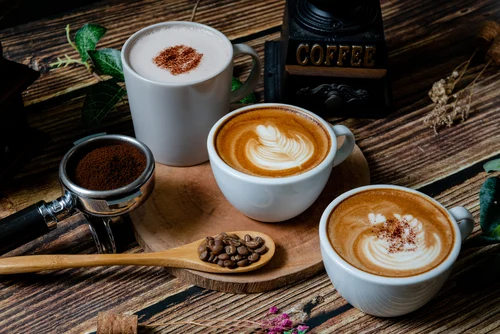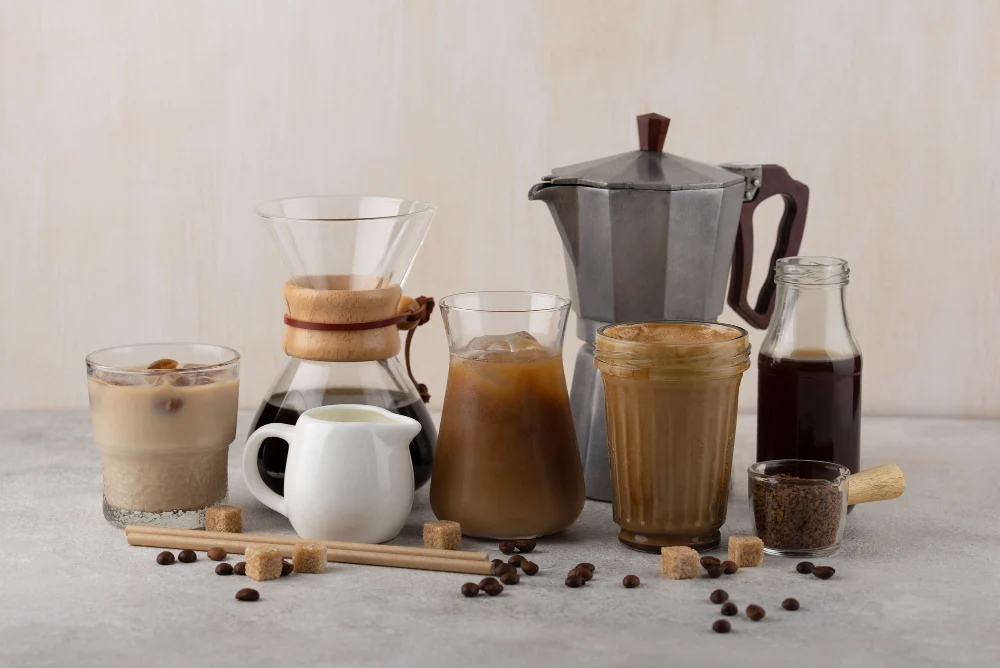
When the aroma of freshly brewed coffee fills the air, it instantly lifts the mood. Whether it’s a morning kickstart or an afternoon pick-me-up, the type of coffee you choose can impact the course of your day. It can not only affect your energy levels, digestion, heart health, and much more. But with so many different roasts and brewing methods, it’s important to know which types of coffee varieties are healthy.
Let’s break down the most common types of coffee and the key coffee benefits you need to know to make your daily cup a healthier one.
Is Coffee Actually Good for You?

Yes, as long as it’s consumed in moderation. Antioxidants like polyphenols and flavonoids, which are abundant in coffee, support overall health by lowering inflammation.
Let’s check out some of the common coffee benefits:
Health Benefits of Coffee Backed by Research
1. Linked to Lower Risk of Type 2 Diabetes
Whether regular or decaf coffee, long-term consumption of both has been associated with a reduced risk of developing type 2 diabetes. Research suggests that natural compounds in coffee may help your body control blood sugar and respond to insulin more efficiently[1].
2. Supports Liver Health
Due to its antioxidants, like polyphenols, present even in decaf varieties, studies suggest that coffee may lower the risk of chronic liver conditions like cirrhosis and even hepatocellular carcinoma[2].
3. Boosts Energy and Brain Function
Caffeine in the coffee stimulates the central nervous system, helping you feel more alert and less fatigued. Caffeine intake helps in improving memory, processing speed, and even enhancing mood[3].
4. May Protect Against Neurodegenerative Diseases
Antioxidant and anti-inflammatory properties in coffee may help protect brain cells from damage. According to studies, habitual coffee drinkers show a lower risk of Alzheimer’s, Parkinson’s, and other neurodegenerative disorders[4].
That said, not all coffee is created equal. The bean type, roast, brewing method, and what you add to it (milk, sugar, syrups) can all change its health impact.
Types of Coffee
I. Based on Brewing Method

1. Black Coffee: The Cleanest Choice
Black coffee or Americano can be considered as the healthiest coffee of all. With zero added calories or sugar, it is your go-to if you’re watching calories. It’s rich in antioxidants and can provide all the benefits of coffee as is, including better focus, concentration, and weight management.
2. Cold Brew: Gentler on the Stomach
Leveraging most of the benefits of regular black coffee, cold brew is typically less acidic than hot-brewed coffee. This type of coffee is made by steeping grounds in cold water for 12–24 hours and usually has more caffeine than regular iced coffee. Since it’s a smoother, less acidic cup of coffee, it’s ideal for people with sensitive stomachs or acid reflux.
3. Espresso: Small Dose, Big Impact
Espresso is a concentrated form of coffee served in small shots. It is made by forcing steam through ground coffee beans. While it’s strong, it’s also typically consumed in smaller amounts. Espresso contains the same antioxidants as other coffees. Used as a base for many other coffees, it is best enjoyed without syrups or sugary milk froths.
4. Pour-Over and Filtered Coffee: Great for Heart Health
Brewing coffee using a paper filter (like pour-over or drip machines) is a smart choice for heart health. Filters catch oily compounds called diterpenes, which can raise LDL (bad) cholesterol levels if consumed in large amounts. Filtered coffee retains most of its antioxidants but reduces potentially harmful compounds, making it a heart-friendly option.
II. Based on Preparation

Latte: Made with 1 shot of espresso and 3 parts steamed milk, lattes are creamy and mild in flavor, often the go-to choice for beginners.
Cappuccino: A balanced blend of espresso, steamed milk, and milk foam (1:1:1 ratio). It’s lighter and offers a more intense coffee flavor than a latte.
Mocha: A chocolate-flavored variation of a latte. It combines espresso, steamed milk, and chocolate syrup, great for those with a sweet tooth.
Flat White: Similar to a latte but with a higher ratio of coffee to milk. It uses microfoam for a velvety texture and stronger coffee flavor.
Macchiato: An espresso “stained” with a dollop of milk foam. Stronger than a latte or cappuccino, with just a hint of creaminess.
Bulletproof Coffee: Blended with butter and MCT oil, this high-fat coffee is popular among keto followers for sustained energy and satiety.
III. Based on Roast & Bean Type

1. Light Roast vs. Dark Roast
The roast level affects flavor, caffeine content, and antioxidant levels.
Light Roast: Tends to have more caffeine and can retain higher levels of polyphenols.
Dark Roast: Has slightly fewer antioxidants but is gentler on the stomach and often richer in flavor.
2. Robusta vs. Arabica Beans
Robusta: Has higher caffeine and antioxidants, but a stronger, more bitter taste.
Arabica: Has a smoother flavor, less caffeine, and is easier on digestion.
For most antioxidants, light-to-medium roasts (especially made from Robusta beans) are a solid choice. However, dark-roast Arabica may be easier to digest.
IV. Based on Add-ons and Infused Variants

6. Turmeric Coffee or Spiced Brews: Anti-Inflammatory Blend
Dark roasts retain a high level of antioxidants while being gentler on the stomach. Adding spices like turmeric, cinnamon, or nutmeg not only enhances the flavor but also offers added health benefits. Turmeric, for example, has well-known anti-inflammatory properties. Adding anti-inflammatory ingredients like turmeric gives your cup an extra health boost.
7. Matcha or Green Tea: Coffee Alternatives
If you’re looking to cut back on caffeine but still want an energy lift, matcha is a great option. It offers antioxidants and a more stable release of energy without the jitters some people experience with coffee.
Types of Coffee to Be Careful With

Not all brews are equal. While coffee can be a healthy drink, some types of coffee may do more harm than good when overconsumed:
-Unfiltered French Press: This rich, bold brew is high in cafestol and kahweol, natural oils (diterpenes) that can raise LDL cholesterol.
–Sugar-Loaded Lattes & Mochas: Popular café options often contain added syrups, whipped cream, and whole milk, making them high in calories and sugar, potentially spiking blood sugar and increasing fat storage.
-Blonde Robusta: Robusta beans are naturally higher in caffeine. Combined with the lighter roast (which retains more caffeine), this combo can heighten anxiety and jitteriness in sensitive individuals.
How to Make Your Coffee Healthier

To each their own. Whatever your preferred choice of coffee, here is how you can make the best out of it:
-Go easy on your add-ons. Steer clear of sugar and flavored creamers. Instead, use cinnamon, cacao, or plant-based milk if needed.
-Watch your caffeine intake. Aim for no more than 400 mg per day (about 3–4 cups).
-Always drink water alongside coffee to maintain hydration.
Final Sip
There’s no one-size-fits-all answer when it comes to the best or healthiest coffee. But by understanding the different types of coffee and how they affect your health, you can make informed choices without giving up the pleasure of your daily brew. Whether you’re sipping on black coffee, experimenting with pour-overs, or blending in your favorite spices, just remember: moderation and mindfulness make every cup count.
FAQs
- Is black coffee good for weight loss?
Yes, black coffee can support weight loss due to its low calorie count and metabolism-boosting properties. It contains caffeine, which may help increase fat burning and energy expenditure when consumed in moderation. - How much coffee is safe per day?
For most healthy adults, up to 3–4 cups of coffee per day (about 300–400 mg of caffeine) is considered safe. However, those with anxiety, acidity, or sleep issues should limit their intake. - What’s the healthiest coffee preparation?
Black coffee brewed using filter or drip methods is often considered the healthiest. It’s free of added sugars and fats, allowing you to enjoy antioxidants and energy-boosting effects without extra calories.
(The article is written by Dr.Subita Alagh, Senior Executive, and reviewed by Monalisa Deka, Senior Health Content Editor)
Recommended Reads
Why You Should Try Ghee Coffee to Lose Weight, Promote Digestion, and More
6 Foods You Should Never Pair with Coffee
References
- Kolb H, Martin S, Kempf K. Coffee and Lower Risk of Type 2 Diabetes: Arguments for a Causal Relationship. Nutrients. 2021;13(4):1144. Published 2021 Mar 31. doi:10.3390/nu13041144
- Contaldo F, Santarpia L, Pasanisi F. Chronic inflammatory liver diseases and coffee intake. Curr Opin Clin Nutr Metab Care. 2019;22(5):389-392. doi:10.1097/MCO.0000000000000586
- Fiani B, Zhu L, Musch BL, et al. The Neurophysiology of Caffeine as a Central Nervous System Stimulant and the Resultant Effects on Cognitive Function. Cureus. 2021;13(5):e15032. Published 2021 May 14. Doi:10.7759
- Kolahdouzan M, Hamadeh MJ. The neuroprotective effects of caffeine in neurodegenerative diseases. CNS Neurosci Ther. 2017;23(4):272-290. doi:10.1111/cns.12684